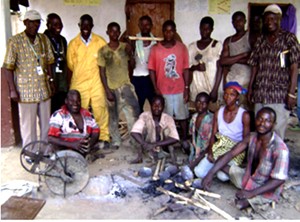
Saah Fassi is a professional blacksmith in Foya, Lofa County, Liberia. Although he does not know his exact age, Fassi does know that he apprenticed in his youth for almost a decade. He estimates he has been a master blacksmith for more than three decades and might be in his late 50’s. He is married, and he and his wife have five children, two boys and three girls.
During the Liberian confl ict, which ended in 2003, Fassi and his family fled over the nearby border to Guinea. Upon returning to Liberia, he practiced his trade in a hut. Fassi has faced additional challenges in his life beyond the unrest in his country. He contracted polio as a child, and the viral infection debilitated his legs. As a result, he cannot stand, and he walks on his knees.
Fassi was connected with a USAID program aimed at helping returning Liberians generate income and create jobs. USAID invested in Fassi’s blacksmith business and provided him with training in exchange for him training apprentices. Fassi has since employed five of the eight apprentices who trained in his shop; three of his new employees are also people with physical disabilities.
Even before the USAID program ended, the increased capacity of his business allowed him to accept several large orders for agricultural tools; the first order worth $1,650 came from the Adventist Disaster Relief Association (ADRA). Fassi is strict about quality control. He received three orders from ADRA, and he received an $1,800 order from German aid agency GTZ to produce 600 hoes. GTZ originally requested 1,000 hoes but Fassi, wanting to deliver high quality tools and recognizing his shop’s capacity, limited the order to 600.
There are 25 people with physical disabilities in the Foya community and Fassi is a tremendous role model for them and the young people in general who see his success would not be possible without his determination and hard work.







Comment
Make a general inquiry or suggest an improvement.